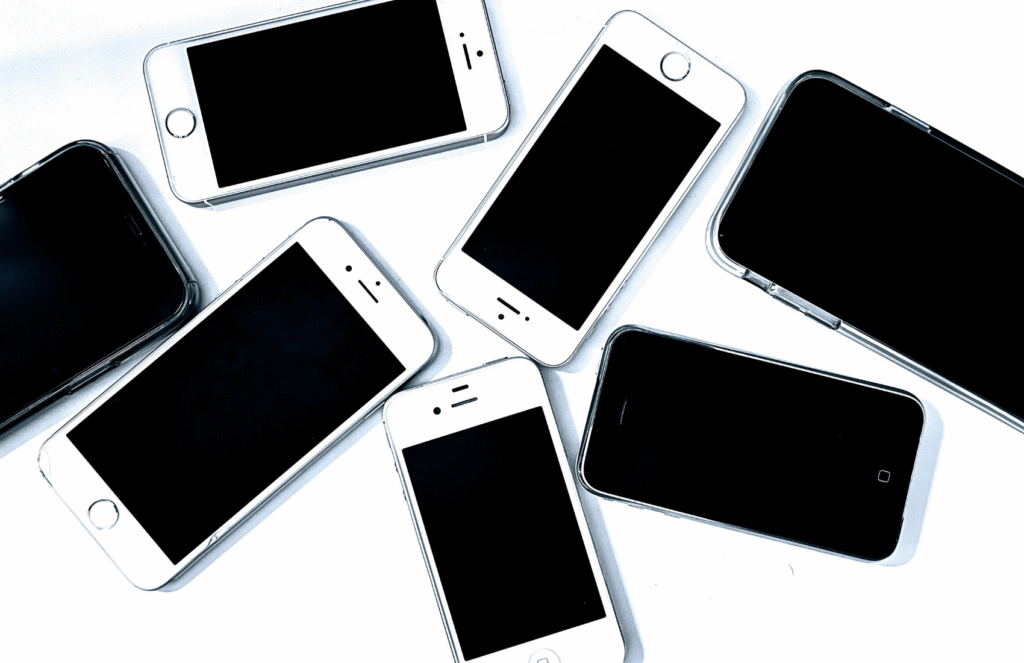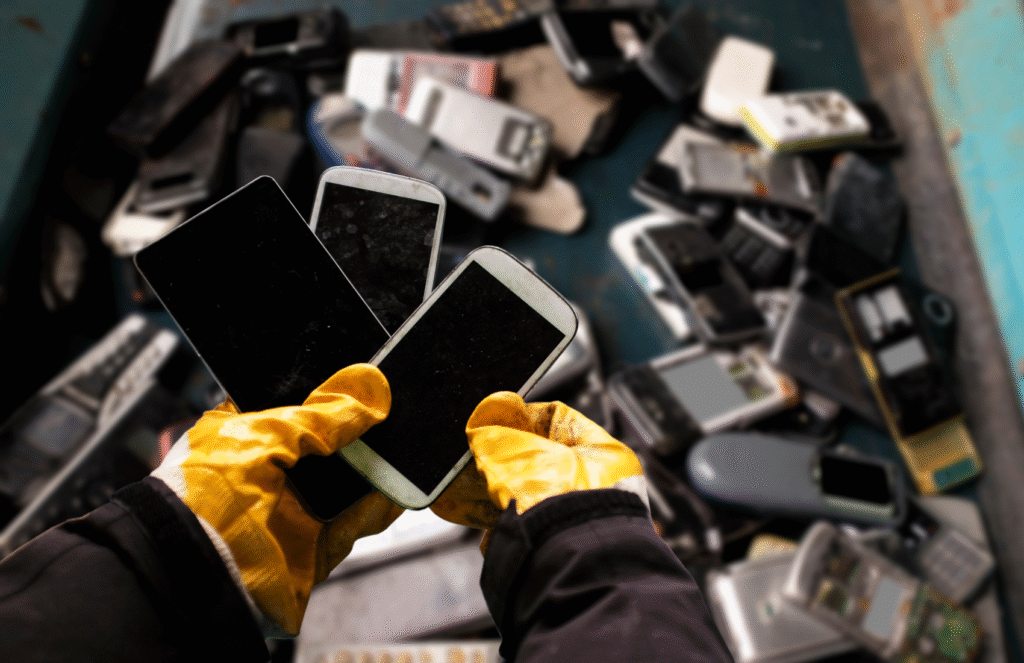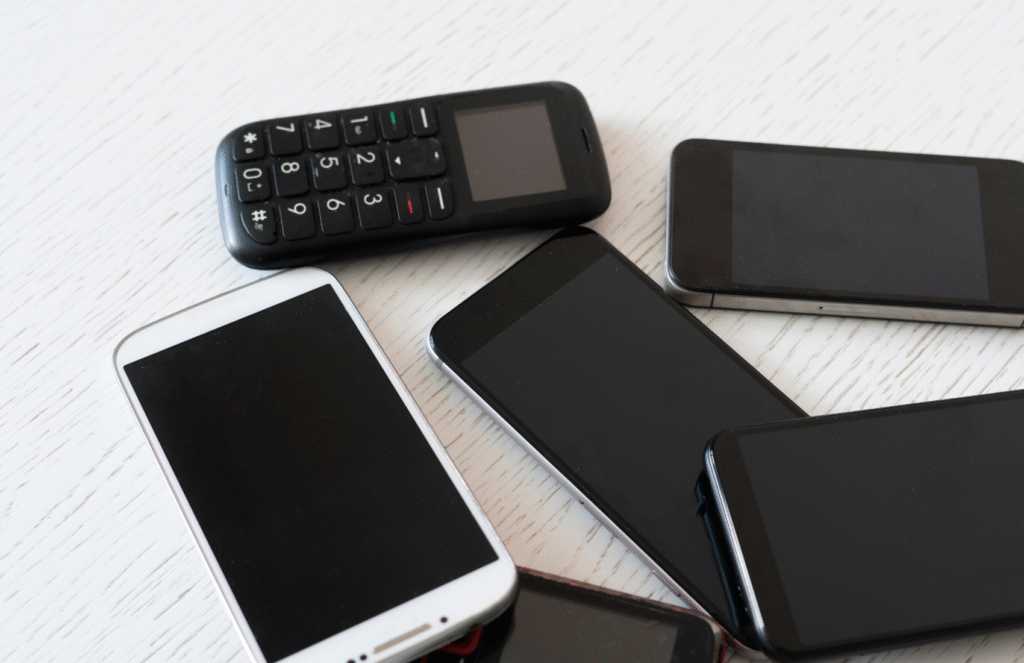What to Do with Old Cell Phones: A Complete Guide to Responsible Phone Recycling
If you’re like most Americans, you probably have at least one old cell phone sitting in a drawer somewhere. Maybe it’s your previous iPhone gathering dust, or perhaps you’ve accumulated several outdated smartphones over the years. With the average person upgrading their phone every 2-3 years, this creates a staggering 150 million discarded devices annually in the United States alone.
The question “what to do with old cell phones” is more important than ever, as these devices contain both valuable materials worth recovering and personal data that needs protection. At CJD E-Cycling, we’ve helped thousands of individuals and businesses properly dispose of their old phones, and we’ve seen firsthand both the opportunities and risks that come with improper phone disposal.
The good news? There are several responsible options for dealing with your old devices, from maximizing resale value to ensuring environmentally sound recycling. The key is understanding which option makes the most sense for your specific situation.
The Hidden Value and Risks in Your Old Cell Phones
What’s Actually Inside Your Old Device
Your old cell phone is essentially a small treasure chest of valuable materials. Each device contains approximately $1-2 worth of recoverable precious metals, including gold in the circuit boards, silver in the electrical contacts, and rare earth elements in the speakers and vibration motors. When you multiply this across millions of devices, the material value becomes substantial.
But there’s also significant risk hiding in that old phone. Even if you think you’ve deleted everything, personal data often remains accessible through recovery software. Photos, text messages, contact lists, email accounts, and even financial app data can potentially be retrieved by someone with the right tools and knowledge.
During our phone recycling operations at CJD E-Cycling, we’ve recovered personal information from phones that owners were certain had been completely wiped. One particularly concerning case involved a donated phone that still contained access to the previous owner’s banking app – a security vulnerability that could have led to identity theft or financial fraud.
Why You Shouldn’t Just Throw Phones Away
Many states now have laws specifically prohibiting cell phones from regular household trash due to their toxic components. Lithium-ion batteries can leak harmful chemicals into groundwater, while the various metals and plastics require specialized processing to avoid environmental contamination.
Beyond legal and environmental concerns, throwing away your old phone means losing any potential value recovery. Even broken phones contain materials worth recycling, and functional devices might have significant resale or trade-in value that you’re essentially throwing in the garbage.
Perhaps most importantly, regular trash disposal offers no data security protection. Your phone could end up in the hands of someone who knows how to retrieve personal information, creating potential privacy and security risks.
Step-by-Step Guide: What to Do with Old Cell Phones
Data Security First
Before considering any disposal option, protecting your personal information must be the top priority. Start by backing up any photos, contacts, or other data you want to keep to cloud storage or your new device. Many people skip this step and later regret losing years of photos and memories.
Next, sign out of every account connected to your phone. This includes obvious accounts like email and social media, but don’t forget about banking apps, shopping apps, streaming services, and any other applications where you’ve stored login credentials. Many apps remember your login information even after you think you’ve signed out.
The factory reset process varies by phone type, but it’s essential regardless of your disposal method. For iPhones, go to Settings > General > Transfer or Reset iPhone > Erase All Content and Settings. Android users should find the reset option under Settings > System > Reset or similar menu structures.
Don’t forget about your SIM card and any external storage cards. Remove these before disposal, as they can contain personal information and account access that persist even after factory resets. For maximum security, consider physically destroying old SIM cards rather than just removing them.
Assess Your Phone’s Condition and Value
Understanding your phone’s current condition helps determine the best disposal method. Working phones in good cosmetic condition often have significant resale value, especially if they’re relatively recent models from popular manufacturers like Apple or Samsung.
Phones with minor damage – cracked screens, worn cases, or battery issues – might still qualify for trade-in programs, though at reduced values. These devices are excellent candidates for professional phone recycling services that can safely extract valuable materials while ensuring data security.
Completely broken phones, water-damaged devices, or very old models typically have no resale value but still contain materials worth recovering through recycling. Even flip phones from the early 2000s contain precious metals and components that professional recyclers can process responsibly.
Age plays a crucial role in determining value and disposal options. Generally, phones more than 4-5 years old have minimal resale value but maximum environmental impact if not recycled properly. These older devices often contain more problematic materials that require specialized handling.
Best Options for Different Phone Conditions
Working Phones: Maximize Value Before Recycling
If your old cell phone still functions properly, you have several options to recover value before considering recycling. Manufacturer trade-in programs often offer the most convenient option, with Apple, Samsung, and Google providing direct trade-in credits toward new device purchases.
Carrier buyback programs through Verizon, AT&T, T-Mobile, and other providers offer similar convenience and sometimes competitive pricing. These programs typically provide instant quotes online and may offer promotional bonuses during certain periods.
Third-party resale platforms like Swappa, Gazelle, or local marketplaces can sometimes yield higher returns, but require more effort and come with additional risks. You’ll need to handle shipping, deal with potential buyers, and manage the sales process yourself.
Consider donation if your phone has modest value but could benefit someone in need. Many charitable organizations accept working cell phones for distribution to domestic violence shelters, senior centers, or international aid programs. This option provides no financial return but offers significant social impact.
Family and friend transfers represent another valuable option, especially for parents upgrading children’s phones or sharing devices within extended family networks. This keeps the phone in productive use while ensuring your data security through trusted relationships.
Damaged Phones: Recycling is Your Best Bet
When your phone has significant damage but retains some functionality, professional phone recycling becomes the most practical option. Cracked screens, water damage, or hardware failures typically eliminate resale value, but these devices still contain valuable materials worth recovering.
At CJD E-Cycling, we regularly process damaged phones that owners assume are worthless. Even phones that won’t power on contain circuit boards with precious metals, rare earth elements in speakers and cameras, and lithium batteries that must be properly recycled rather than disposed of in landfills.
Manufacturer recycling programs accept non-functional devices from their own brands, though they typically offer no financial compensation. Apple’s recycling program takes any Apple device regardless of condition, while Samsung and other manufacturers offer similar services for their products.
Major retailers like Best Buy and Staples operate drop-off programs that accept phones from any manufacturer. These programs provide convenient disposal options, though they may not offer the specialized data destruction services that businesses or security-conscious individuals require.
Very Old Phones: Specialized Recycling Required
Vintage phones, including flip phones and early smartphones, present unique recycling challenges due to their different materials and construction methods. These devices often contain components that require specialized processing techniques not available through standard e-waste programs.
Battery safety becomes particularly important with older phones, as aging lithium-ion and nickel-metal hydride batteries can become unstable over time. Professional recycling services have the expertise and equipment to safely handle these potentially hazardous components.
Some very old phones actually contain higher concentrations of precious metals than modern devices, making them particularly valuable for materials recovery. However, this also means they require more sophisticated processing to safely extract these materials without environmental harm.
The Phone Recycling Process: What Happens Next
Professional Data Destruction
When you recycle phone through a professional service like CJD E-Cycling, data security remains our top priority throughout the process. While factory resets remove most user-accessible data, forensic recovery tools can often retrieve information from devices that appear completely wiped.
Our data destruction process goes far beyond consumer-level deletion. We use professional-grade software that overwrites storage multiple times with random data patterns, making recovery virtually impossible. For devices containing highly sensitive information, we offer physical destruction of storage components.
This thorough approach proved crucial during a recent project involving a law firm’s old business phones. Despite the attorneys believing they had properly cleared all client information, our forensic analysis revealed recoverable case notes and client communications that could have created serious confidentiality breaches if not properly destroyed.
For businesses and individuals requiring compliance documentation, we provide certificates of destruction that legally verify complete data elimination. These certificates satisfy insurance requirements, regulatory compliance needs, and professional liability concerns.
Material Recovery and Processing
The physical recycling process begins with careful disassembly to separate different material types. Batteries are removed first and sent to specialized facilities equipped to handle lithium-ion recycling safely. These batteries contain valuable lithium, cobalt, and other materials that can be recovered for new battery production.
Circuit boards undergo precious metal recovery processes that extract gold, silver, platinum, and palladium. These materials are refined and returned to manufacturing supply chains, reducing the need for environmentally destructive mining operations. A single ton of recycled phones can yield more gold than a ton of gold ore.
Plastic components are sorted by type and color, then processed into pellets that manufacturers use to create new products. The various plastics in phones – from cases to internal components – can be recycled into everything from new electronic housings to outdoor furniture.
Glass and ceramic components, including screens and camera lenses, follow separate recycling streams. Screen glass often contains specialized coatings that require careful processing, while ceramic components may contain rare earth elements that justify sophisticated recovery procedures.
Rare earth element extraction represents one of the most environmentally important aspects of phone recycling. These materials are crucial for electronics manufacturing but typically come from environmentally destructive mining operations. Recovering them from old phones reduces pressure on these sensitive ecosystems.
Environmental Benefits of Proper Phone Recycling
Proper phone recycling generates significant environmental benefits beyond simple waste diversion. Each recycled phone prevents approximately 1-2 pounds of toxic materials from entering landfills, where they could leach into groundwater systems over decades.
The carbon footprint reduction from materials recovery is substantial. Manufacturing new phones requires energy-intensive mining, refining, and processing operations that recycling avoids. Studies suggest that recycling one phone saves enough energy to power a laptop computer for over 40 hours.
Through our recycling operations, CJD E-Cycling has diverted thousands of pounds of electronic waste from local landfills while recovering materials equivalent to several pounds of gold, silver, and other precious metals. This material recovery reduces mining pressure while supporting domestic manufacturing supply chains.
Common Mistakes to Avoid When Disposing of Phones
Data Security Errors
The most serious mistake people make when figuring out what to do with old cell phones involves incomplete data security preparation. Simply deleting photos and contacts leaves vast amounts of recoverable information on the device, including cached web pages, app data, and system logs that may contain personal information.
Many people forget about cloud account synchronization, leaving their old phone connected to services like iCloud, Google Drive, or Dropbox. Even after factory reset, these connections can potentially be restored, providing access to current data from your new device.
Stored passwords represent another frequently overlooked security risk. Both iPhones and Android devices can store login credentials for websites, apps, and services that persist through incomplete deletion processes. Professional data destruction addresses these hidden vulnerabilities.
SIM card data exposure creates additional risks that many people ignore. While modern SIM cards store relatively little information, they can contain contact lists, text messages, and network authentication data that should be destroyed rather than simply removed.
Disposal Method Mistakes
Choosing inappropriate disposal methods represents another common error when people decide what to do with old cell phones. Regular trash disposal violates environmental regulations in many areas while providing zero data security protection.
Unverified recycling services may lack proper certifications or security protocols. Some disreputable operators collect phones claiming to recycle them responsibly, then export them to developing countries where they’re processed under dangerous conditions without environmental protection.
Informal trade-ins through classified ads or online marketplaces can expose you to fraud while providing inadequate data protection. Unless you’re completely confident in your data deletion abilities, these transactions create unnecessary privacy risks.
Ignoring manufacturer and carrier programs means missing out on convenient, legitimate disposal options that often provide better environmental outcomes than third-party alternatives. These programs are specifically designed to handle their products responsibly.
Special Considerations for Business Phone Disposal
Corporate Data Security Requirements
Businesses face additional complexities when determining what to do with old cell phones, particularly around data security and compliance requirements. Corporate devices often contain customer information, financial data, and proprietary business information that requires specialized handling.
BYOD (Bring Your Own Device) policies create particular challenges, as personal phones used for business may contain both personal and corporate data requiring different security levels. Professional recycling services can provide customized solutions that address these mixed-use scenarios.
Compliance requirements under regulations like HIPAA, SOX, or industry-specific standards may mandate specific data destruction methods and documentation. Healthcare organizations, financial institutions, and other regulated industries often require certificates of destruction for audit purposes.
Employee privacy considerations add another layer of complexity, as businesses must balance security needs with respect for personal information that may exist on company-provided devices. Clear policies and professional disposal services help navigate these sensitive situations.
Working with Professional Services
Professional phone recycling services become essential when businesses need to recycle phone devices in bulk or meet specific compliance requirements. These services provide secure transportation, documented chain of custody, and certified data destruction that individual disposal methods cannot match.
Certificate requirements for business compliance often necessitate professional services that can provide legally defensible documentation of proper disposal. Insurance companies, auditors, and regulatory agencies increasingly require this documentation.
Chain of custody documentation tracks each device from collection through final processing, providing the transparency that businesses need for compliance and liability protection. This documentation becomes crucial if disposal practices are ever questioned.
Volume pricing and pickup services make professional recycling cost-effective for businesses with multiple devices. Rather than tasking employees with individual disposal responsibilities, businesses can ensure consistent, compliant processing for all devices.
Environmental Impact: Why Phone Recycling Matters
The Global E-Waste Crisis
Cell phones contribute significantly to the global electronic waste crisis, with their rapid replacement cycles creating constant disposal pressure. The average smartphone contains over 60 different elements, many of which are toxic or require environmentally destructive mining operations.
When phones end up in developing countries for informal recycling, workers often lack protective equipment while processing devices using dangerous methods like acid baths and open burning. These practices release toxic fumes and contaminate local water supplies, creating serious health hazards.
Resource depletion from mining new materials for phone production puts tremendous pressure on ecosystems worldwide. Rare earth mining, in particular, often involves significant environmental destruction that proper recycling can help minimize.
Positive Impact of Responsible Recycling
Material recovery through professional phone recycling provides substantial environmental benefits. Recovering one ounce of gold through recycling saves approximately 20 tons of mined ore and reduces associated environmental damage.
Environmental protection benefits extend beyond material recovery to include proper handling of toxic substances. Professional recycling ensures that harmful materials like lead, mercury, and cadmium are contained and processed safely rather than released into the environment.
Supporting circular economy principles through responsible phone recycling helps reduce overall resource consumption while creating economic incentives for sustainable practices. This approach benefits both environmental protection and economic development.
Your Phone Recycling Action Plan
When deciding what to do with old cell phones, start by honestly assessing each device’s condition and your security requirements. Working phones with resale value deserve consideration for trade-in or resale options, while damaged or older devices should go directly to professional recycling services.
Securing your personal data must be the first priority regardless of which disposal method you choose. Take time to properly back up important information, sign out of all accounts, perform factory resets, and remove SIM cards before proceeding with any disposal option.
Choose appropriate disposal methods based on your specific situation. Individuals with single devices have different needs than businesses disposing of multiple phones, and security requirements vary based on the type of information your devices have accessed.
Verify recycler credentials before committing to any service, especially for businesses with compliance requirements. Look for certifications like R2 (Responsible Recycling) or e-Stewards that demonstrate commitment to environmental and social responsibility.
Keep documentation of your disposal activities, particularly if you’re handling business devices or have security concerns. Certificates of destruction and recycling documentation provide legal protection and demonstrate responsible practices.
Ready to recycle phone devices responsibly? Contact CJD E-Cycling today for a free consultation about your phone disposal needs. Whether you have a single device or hundreds of business phones requiring secure disposal, we provide comprehensive solutions that protect both your data and the environment. Our certified processes ensure complete data destruction while maximizing material recovery for environmental benefit. Don’t let your old phones become security risks or environmental problems – choose professional recycling for peace of mind and responsible disposal.ye



